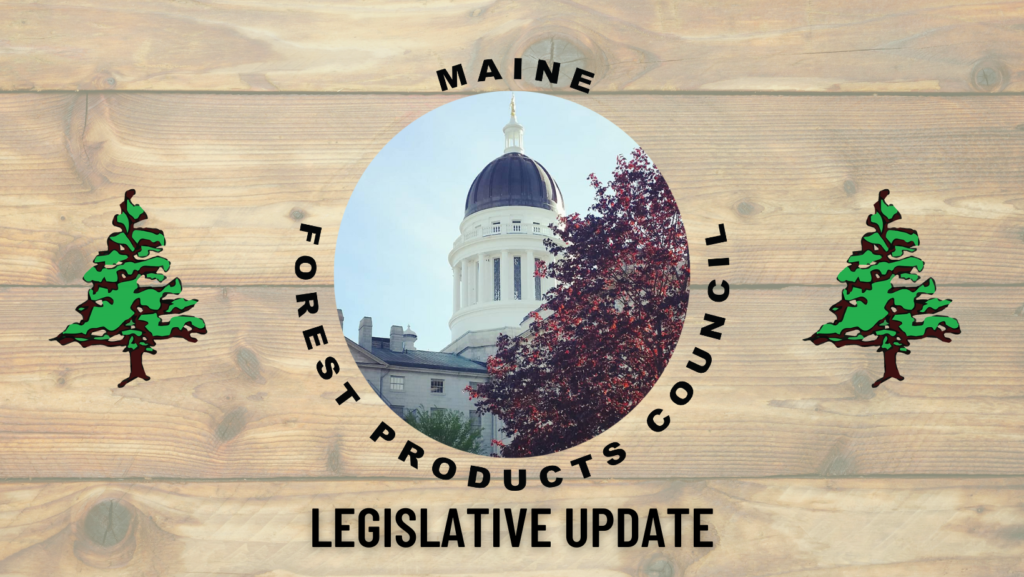Committees were hard at work this week in Augusta working their way through a number of bills of interest, but before we dive into the previous week, I would first like to draw your attention to two bills that are scheduled for public hearings next week that are opposed by the Maine Forest Products Council.
The first bill is LD 993, “An Act to Facilitate Stakeholder Input Regarding Forest Policy in Maine.” This bill is scheduled for a public hearing before the Agriculture, Conservation and Forestry Committee on Monday at 9:00 AM. You can tune into the hearing here.
We strongly oppose this bill because, should it pass, it would politicize important forest management decisions, subjecting private landowners and the Bureau of Forestry to the will of a simple majority of a 21-member board appointed by the President of the Senate and the Speaker of the House.
As drafted, critical forest policies that determine how private landowners manage their land could be decided by as few as six members, as an affirmative vote of the majority of members present can decide any measure brought before the board. A quorum is defined as only 11 members.
Private landowners already work collaboratively with the state, the University of Maine System and the environmental advocacy community on a number of successful initiatives to protect Maine’s wildlife resources.
More information about our collaborative efforts and positive outcomes can be found on our fact sheet here.
LD 993 disregards the tremendous work that continues to take place, and the strides our industry has made in recent years, so please join us in testifying in opposition to LD 993.
The second bill of concern is LD 928, “Resolution, Proposing an Amendment to the Constitution of Maine to Establish a Right to a Clean and Healthy Environment.” This bill is scheduled for a public hearing before the Environment and Natural Resources Committee on Wednesday at 9:00 AM. You can tune into the hearing here.
This proposed constitutional amendment raises many legal questions about the effect on Maine government, law and citizens. The Maine Legislature should carefully review this proposal to understand its ramifications, which include the creation of a litigious regulatory environment at both the state and local levels. This bill is a repeat of LD 489 from last session, but it has been presented in a more limited form. Our testimony against the bill last session can be found here. Please also consider joining us in testifying in opposition to LD 928.
Information on how to testify can be found here. If you have any questions, or need help submitting testimony, please contact Krysta at kwest@maineforest.org.
That’s just a taste of what’s ahead. For a picture of the full week, take a look below.
Last week, the Council monitored several bills and testified on three. On Monday, the Agriculture, Conservation and Forestry Committee revisited LD 180, “An Act to Allow a Person to File a Paper Copy of a Timber Harvest Notification Form.” The Committee voted unanimously to kill the bill with the condition that this letter be sent to the Bureau of Forestry.
On Wednesday, we testified in support of LD 881, “Resolve, Directing the University of Maine System to Study the Development of a Course Regarding the Use of Manufactured Wood Products” before the Education and Cultural Affairs Committee. As reflected in our testimony, the sponsor of this bill, Rep. Samuel Zager, has proposed an amendment to have the study instead focus on identifying barriers that exist for cross laminated timber (CLT) in Maine.
We also testified in support of LD 652, “An Act to Allow the Reinstatement of Certain Commercial Drivers Licenses” and in support of LD 607, “Resolve, to Direct the Department of Transportation to Examine the Feasibility of Extending Interstate 95 to the St. John Valley.” Our testimony on all of these bills is linked above.
That is all for now. As always, if you have any questions or concerns, please don’t hesitate to reach out.
-Pat


